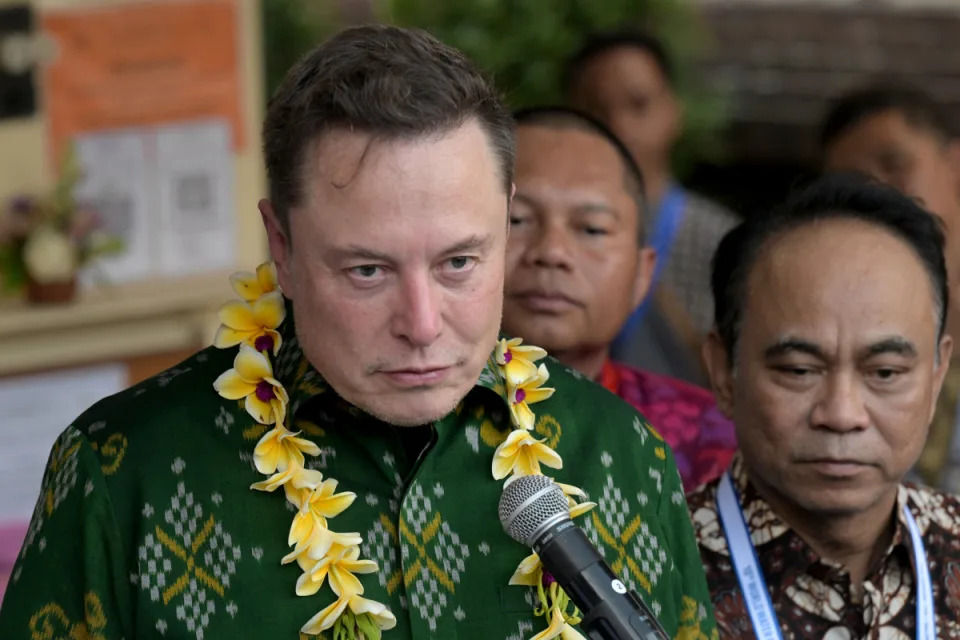Space is infinite, but it may still not be big enough for both Elon Musk and Jeff Bezos.
The two billionaires could be heading for a showdown in the stars as their private space race heats up.
Related: Analyst revamps Tesla stock price target on Musk-Trump connection
A year ago, Amazon ( AMZN ) , the e-commerce giant founded by Bezos, announced that it had bought three rocket launches from Musk's SpaceX for the company's Project Kuiper internet satellites.
This is intriguing in light of the fact that Amazon is now looking to go head-to-head with the Tesla ( TSLA ) CEO's Starlink satellite internet network.
In addition to Project Kuiper, Bezos’ rocket company, Blue Origin, plans to launch New Glen, a massive rocket that will compete directly with SpaceX's reusable Falcon 9 rockets, The New York Times reported on Dec. 17.
🚨 Don’t Miss this amazing Black Friday Move! Get 60% off TheStreet Pro. Act now before it’s gone . 😲
The Times noted that SpaceX carried about 85% of all orbital mass put into space in the most recent quarter, 12 times as much as the next-largest launcher, China Aerospace Science and Technology Corporation (CASC), China’s primary government contractor.
As the world's dominant space launch provider, SpaceX has completed over 130 launches this year and is testing an even bigger rocket, Starship.
Starlink has more than 6,000 satellites positioned above the globe and serves more than four million customers.

Amazon's Kuiper headed by former Starlink executive
"Worth getting @Starlink as a backup, even if you already have great Internet," Musk said in a Dec. 19 post on X, formerly Twitter, which he owns."Your landline connection might go down just when you most need it!"
Separately, SpaceX and Musk, who spent upwards of $260 million in efforts to send Donald Trump back to the White House, face at least three federal reviews over whether they have complied with federal reporting protocols aimed at protecting state secrets, the Times reported .
Related: Analysts revamp Amazon stock price target after AWS AI update
Musk reportedly failed to provide some details of his meetings with foreign leaders, including Russian President Vladimir Putin.
The competition for satellite business is understandable given the sector's growth.
During 2023, the overall global space economy generated revenue of $400 billion, according to the Satellite Industry Association .
The commercial satellite industry continued to be dominant, increasing to $285 billion and accounting for 71% of the world’s space business
Increasing satellite broadband subscriptions and revenue along with remote sensing revenue growth combined to help generate a total of $110.2 billion in satellite services revenue last year, the association said.
Kuiper was set up in 2019 to deploy a large satellite internet constellation to provide low-latency broadband connectivity, meaning a computer network that can process a large amount of data messages with minimal delay.
The Federal Communications Commission granted Amazon a license to deploy and operate Project Kuiper satellites in 2020.
The name comes from the Kuiper Belt, a region of the solar system beyond Neptune's orbit of Neptune, believed to contain many comets, asteroids, and other icy objects.
The Kuiper Belt is named after the Dutch astronomer Gerard Kuiper, considered to be the father of modern planetary science.
"Project Kuiper is Amazon’s initiative to provide fast, affordable broadband to communities around the world that are currently unserved or underserved by traditional internet and communications options," author Thomas Kohnstamm wrote on Amazon's website last month.
"To achieve this goal, Amazon will deploy thousands of satellites in low Earth orbit (LEO) linked to a global network of antennas, fiber, and internet connection points on the ground," he added.
There are some familiar faces at Kuiper, including its president. Rajeev Badyal, a former vice president at Starlink. Musk reportedly fired him and six other Starlink managers in 2018 because he was displeased with the speed of the division’s development.
Taiwan is in talks with Project Kuiper about co-operating on satellite-based communications, The Financial Times reported , as Taipei beefs up its efforts to make its mobile phone and internet infrastructure less vulnerable to a potential Chinese attack.
Analysts very positive on Amazon satellite project
Technology minister Wu Cheng-wen said on Dec. 17 that French satellite operator Eutelsat, which partnered with Taiwan's state-backed Chunghwa Telecom last year, was falling short in providing sufficient capacity for the country's needs, adding that Taiwan is exploring additional international collaboration.
"There are other companies in the Western world, including some from Europe and from North America and Canada, but Amazon Kuiper is the most mature in the development stage so we are discussing with them at this moment if it is possible that we have a collaboration in the future," Wu said.
More Tesla:
Analysts at Barclays said that Kuiper is like any platform business in technology, as it involves very high upfront capital expenditures and operating losses, "but as the service scales, it should generate strong financial returns for Amazon."
"We are about to enter the stage of heavy losses, but the $61 billion total addressable market (TAM) opportunity is the prize," the firm said in a research note. "The Kuiper initiative at AMZN is one of the company's long-term projects that we are very positive on."
Currently, 17% of US households — some 24 million in all — do not have access to a fixed broadband service and residents are forced to use alternatives, like satellite internet, said Barclays, which kept an overweight rating on Amazon with a $235 price target.
The firm estimated that Kuiper is running at around about $1 billion expense for 2024, with costs primarily associated with the manufacturing of satellites.
From here, Barclays said it expects losses to widen next year to a $3.3 billion operating income drag with capitalized expenses peaking in 2028 as the company aims to launch its 3,230 satellites before the end of 2029.
Kuiper needs 578 satellites up before it can introduce its service, per its FFC license, which Barclays expects Amazon to reach around mid-2026
"Amazon is pointing to a quicker timeline (late 2025) which would have to involve a more rapid launch schedule than what we think is realistic," the firm said.
The Low Earth Orbit market is shaping up as a duopoly with Starlink and Kuiper taking market share from legacy satellite providers.
Barclays estimated the consumer and enterprise back up LEO satellite broadband market will be around $38 billion in 2030.
The firm expects that that the entire Kuiper project will reach positive operating income "payback" to Amazon in 2032.
Related: Veteran fund manager delivers alarming S&P 500 forecast





